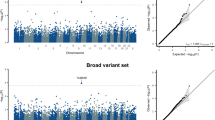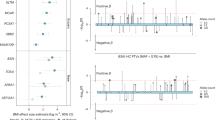Abstract
The majority of reported complex disease associations for common genetic variants have been identified through meta-analysis, a powerful approach that enables the use of large sample sizes while protecting against common artifacts due to population structure and repeated small-sample analyses sharing individual-level data. As the focus of genetic association studies shifts to rare variants, genes and other functional units are becoming the focus of analysis. Here we propose and evaluate new approaches for performing meta-analysis of rare variant association tests, including burden tests, weighted burden tests, variable-threshold tests and tests that allow variants with opposite effects to be grouped together. We show that our approach retains useful features from single-variant meta-analysis approaches and demonstrate its use in a study of blood lipid levels in ∼18,500 individuals genotyped with exome arrays.
This is a preview of subscription content, access via your institution
Access options
Subscribe to this journal
Receive 12 print issues and online access
$209.00 per year
only $17.42 per issue
Buy this article
- Purchase on Springer Link
- Instant access to full article PDF
Prices may be subject to local taxes which are calculated during checkout

Similar content being viewed by others
References
1000 Genomes Project Consortium. An integrated map of genetic variation from 1,092 human genomes. Nature 491, 56–65 (2012).
Kiezun, A. et al. Exome sequencing and the genetic basis of complex traits. Nat. Genet. 44, 623–630 (2012).
Li, B. & Leal, S.M. Methods for detecting associations with rare variants for common diseases: application to analysis of sequence data. Am. J. Hum. Genet. 83, 311–321 (2008).
Kryukov, G.V., Shpunt, A., Stamatoyannopoulos, J.A. & Sunyaev, S.R. Power of deep, all-exon resequencing for discovery of human trait genes. Proc. Natl. Acad. Sci. USA 106, 3871–3876 (2009).
Morris, A.P. & Zeggini, E. An evaluation of statistical approaches to rare variant analysis in genetic association studies. Genet. Epidemiol. 34, 188–193 (2010).
Price, A.L. et al. Pooled association tests for rare variants in exon-resequencing studies. Am. J. Hum. Genet. 86, 832–838 (2010).
Liu, D.J. & Leal, S.M. Replication strategies for rare variant complex trait association studies via next-generation sequencing. Am. J. Hum. Genet. 87, 790–801 (2010).
Zawistowski, M. et al. Extending rare-variant testing strategies: analysis of noncoding sequence and imputed genotypes. Am. J. Hum. Genet. 87, 604–617 (2010).
Wu, M.C. et al. Rare-variant association testing for sequencing data with the sequence kernel association test. Am. J. Hum. Genet. 89, 82–93 (2011).
Lin, D.Y. & Tang, Z.Z. A general framework for detecting disease associations with rare variants in sequencing studies. Am. J. Hum. Genet. 89, 354–367 (2011).
Lin, X. Variance component testing in generalised linear models with random effects. Biometrika 84, 309–326 (1997).
Neale, B.M. et al. Testing for an unusual distribution of rare variants. PLoS Genet. 7, e1001322 (2011).
Ladouceur, M., Dastani, Z., Aulchenko, Y.S., Greenwood, C.M. & Richards, J.B. The empirical power of rare variant association methods: results from Sanger sequencing in 1,998 individuals. PLoS Genet. 8, e1002496 (2012).
Morris, A.P. & Zeggini, E. An evaluation of statistical approaches to rare variant analysis in genetic association studies. Genet. Epidemiol. 34, 188–193 (2010).
Madsen, B.E. & Browning, S.R. A groupwise association test for rare mutations using a weighted sum statistic. PLoS Genet. 5, e1000384 (2009).
Hudson, R.R. Generating samples under a Wright-Fisher neutral model of genetic variation. Bioinformatics 18, 337–338 (2002).
Adams, A.M. & Hudson, R.R. Maximum-likelihood estimation of demographic parameters using the frequency spectrum of unlinked single-nucleotide polymorphisms. Genetics 168, 1699–1712 (2004).
Novembre, J. et al. Genes mirror geography within Europe. Nature 456, 98–101 (2008).
Nelson, M.R. et al. An abundance of rare functional variants in 202 drug target genes sequenced in 14,002 people. Science 337, 100–104 (2012).
Besag, J. & Clifford, P. Sequential Monte Carlo p-values. Biometrika 78, 301–304 (1991).
Tennessen, J.A. et al. Evolution and functional impact of rare coding variation from deep sequencing of human exomes. Science 337, 64–69 (2012).
McPherson, R. et al. A common allele on chromosome 9 associated with coronary heart disease. Science 316, 1488–1491 (2007).
Kathiresan, S. et al. Polymorphisms associated with cholesterol and risk of cardiovascular events. N. Engl. J. Med. 358, 1240–1249 (2008).
Clarke, R. et al. Genetic variants associated with Lp(a) lipoprotein level and coronary disease. N. Engl. J. Med. 361, 2518–2528 (2009).
Krokstad, S. et al. Cohort Profile: the HUNT Study, Norway. Int. J. Epidemiol. 42, 968–977 (2013).
Teslovich, T.M. et al. Biological, clinical and population relevance of 95 loci for blood lipids. Nature 466, 707–713 (2010).
Albrechtsen, A. et al. Exome sequencing–driven discovery of coding polymorphisms associated with common metabolic phenotypes. Diabetologia 56, 298–310 (2013).
Yang, J. et al. Conditional and joint multiple-SNP analysis of GWAS summary statistics identifies additional variants influencing complex traits. Nat. Genet. 44, 369–375 (2012).
Price, A.L. et al. Principal components analysis corrects for stratification in genome-wide association studies. Nat. Genet. 38, 904–909 (2006).
Zhou, X. & Stephens, M. Genome-wide efficient mixed-model analysis for association studies. Nat. Genet. 44, 821–824 (2012).
Lee, S. et al. Optimal unified approach for rare-variant association testing with application to small-sample case-control whole-exome sequencing studies. Am. J. Hum. Genet. 91, 224–237 (2012).
Danecek, P. et al. The variant call format and VCFtools. Bioinformatics 27, 2156–2158 (2011).
Abecasis, G.R., Cherny, S.S., Cookson, W.O. & Cardon, L.R. Merlin—rapid analysis of dense genetic maps using sparse gene flow trees. Nat. Genet. 30, 97–101 (2002).
Purcell, S. et al. PLINK: a tool set for whole-genome association and population-based linkage analyses. Am. J. Hum. Genet. 81, 559–575 (2007).
Hu, Y.J. et al. Meta-analysis of gene-level associations for rare variants based on single-variant statistics. Am. J. Hum. Genet. 93, 236–248 (2013).
Lee, S., Teslovich, T.M., Boehnke, M. & Lin, X. General framework for meta-analysis of rare variants in sequencing association studies. Am. J. Hum. Genet. 93, 42–53 (2013).
Tang, Z.Z. & Lin, D.Y. MASS: meta-analysis of score statistics for sequencing studies. Bioinformatics 29, 1803–1805 (2013).
Genz, A. Numerical computation of multivariate normal probabilities. J. Comput. Graph. Statist. 1, 141–149 (1992).
Zou, F., Fine, J.P., Hu, J. & Lin, D.Y. An efficient resampling method for assessing genome-wide statistical significance in mapping quantitative trait loci. Genetics 168, 2307–2316 (2004).
Coventry, A. et al. Deep resequencing reveals excess rare recent variants consistent with explosive population growth. Nat. Commun. 1, 131 (2010).
Acknowledgements
The authors would like to thank M. Boehnke, X. Wen and S. Zoellner for helpful discussions. This work was supported by research grants R01HG007022 from the National Human Genome Research Institute, R01EY022005 from the National Eye Institute and R01HL117626 from the National Heart, Lung, and Blood Institute. G.M.P. was supported by award T32HL007208 from the National Heart, Lung, and Blood Institute. S.K. is supported by a Research Scholar award from Massachusetts General Hospital (MGH), the Howard Goodman Fellowship from MGH, the Donovan Family Foundation and grant R01HL107816 from the National Heart, Lung, and Blood Institute. The content is solely the responsibility of the authors and does not necessarily represent the official views of the National Heart, Lung, and Blood Institute or the US National Institutes of Health. The WHI program is funded by the National Heart, Lung, and Blood Institute, US National Institutes of Health, US Department of Health and Human Services through contracts N01WH22110, N01WH24152, N01WH32100-2, N01WH32105-6, N01WH32108-9, N01WH32111-13, N01WH32115, N01WH32118-32119, N01WH32122, N01WH42107-26, N01WH42129-32 and N01WH44221. This manuscript was prepared in collaboration with investigators from the WHI and has been approved by the WHI. WHI investigators are listed at https://cleo.whi.org/researchers/SitePages/WHI%20Investigators.aspx. The full list of PROCARDIS acknowledgments is available at http://www.procardis.org/. The Ottawa Heart Genomics Study was supported by Canadian Institutes of Health Research (CIHR) grants MOP-82810, MOP-77682 and MOP-2380941 and Canada Foundation for Innovation (CFI) grant 11966. The studies for the Malmö Diet and Cancer cohort were supported by grants from the Swedish Research Council, the Swedish Heart and Lung Foundation, the Påhlsson Foundation, the Novo Nordic Foundation and European Research Council starting grant StG-282255.
Author information
Authors and Affiliations
Contributions
D.J.L., S.K. and G.R.A. conceived and designed the study. D.J.L., G.M.P. and X.Z. carried out primary data analysis. D.J.L., X.Z. and S.F. wrote the software package implementing the proposed methodologies. O.L.H., M.N., P.L.A., A.G., H.Z., U.P., M.F., M.O.-M., C.K., R.M., H.W., C.J.W., K.H. and O.M. contributed phenotypes, exome array genotypes and analyses for the study. M.Z. conducted population genetics simulation analysis. D.J.L. and G.R.A. wrote the first version of the manuscript. All authors critically reviewed and approved the manuscript. S.K. and G.R.A. jointly supervised the study.
Corresponding authors
Ethics declarations
Competing interests
The authors declare no competing financial interests.
Supplementary information
Supplementary Text and Figures
Supplementary Figures 1–15, Supplementary Tables 1–12 and Supplementary Note (PDF 4282 kb)
Rights and permissions
About this article
Cite this article
Liu, D., Peloso, G., Zhan, X. et al. Meta-analysis of gene-level tests for rare variant association. Nat Genet 46, 200–204 (2014). https://doi.org/10.1038/ng.2852
Received:
Accepted:
Published:
Issue Date:
DOI: https://doi.org/10.1038/ng.2852
This article is cited by
-
Powerful, scalable and resource-efficient meta-analysis of rare variant associations in large whole genome sequencing studies
Nature Genetics (2023)
-
The power of genetic diversity in genome-wide association studies of lipids
Nature (2021)
-
PSCAN: Spatial scan tests guided by protein structures improve complex disease gene discovery and signal variant detection
Genome Biology (2020)
-
Scalable generalized linear mixed model for region-based association tests in large biobanks and cohorts
Nature Genetics (2020)
-
Rare-variant collapsing analyses for complex traits: guidelines and applications
Nature Reviews Genetics (2019)



